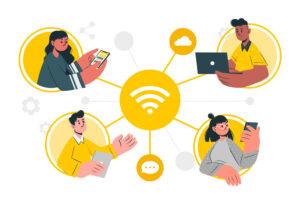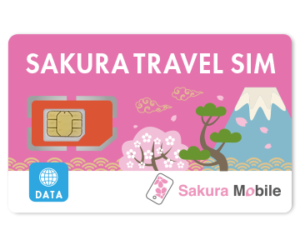
Getting Internet Access in Japan : Wired to Wireless
There are two ways to getting internet access in Japan, wired and wireless. Wired connections are installed in your house, so it can’t be used outside and not movable. In contrast, wireless connections that include pocket WiFi and SIM cards can be brought everywhere.
Accordingly, if you want to stay connected online in Japan, getting an internet service could be the best plan for you. Further in this article, StuDrill will guide you through how to get internet access in Japan, whether it’s wired or wireless.
What is Wired Connection for Getting Internet Access in Japan?
Wired internet connection or fiber-optic line is the mainstream fixed-line Internet in Japan. In addition, fiber-optic line offers high-speed and high-capacity data transmission, so this is highly recommended for getting internet access in Japan for long-term. After that, you have to register and create a contract with two different companies, namely a telecommunications operator and an ISP (Internet Service Provider).
Telecom Carrier & ISP : What’s The Difference?
A telecom carrier is the company that owns and operates the network infrastructure that connects you to the Internet. In addition, they provide the optical fiber cables and other equipment that you need. Some of the telecom carriers in Japan are NTT East, NTT West, KDDI, and cable TV companies.
While an ISP, a company that provides you with the service of accessing the Internet through the optical fiber network of the telecom carrier. However, in other countries the ISP may also take care of the network connection for you. But in Japan, you have to deal with both the telecom carrier and the ISP separately.
Subscribe Your Broadband Carrier & ISP To One Package!
For getting internet access in Japan, you have to know some subscription plans that let you combine your broadband carrier and your ISP into one package. So, it easier for you to pay your bills and manage your service. Before that, you need to apply for a new contract on each service provider’s official website.
Well-Known Broadband Service Recommendations
| Broadband Internet Service | Pros | Cons | Monthly Fee (Condominium/Stand-alone House) |
| GTN Hikari | Multilingual support (English & 6 other languages) | Sometimes the connection might be slow | 3,800 yen/5,200 yen |
| NURO Hikari | The fastest Internet service in Japan | Areas are limited, costs higher, and there’s also installation cost | From 5,743 yen for both condominiums and standalone homes |
| SoftBank Hikari | You can save more with package subscription include your mobile phone plan | Sometimes the connection might be slow | From 3,800 yen/From 5,200 yen (*Prices are without discount) |
| au HIKARI | You can save more with package subscription include your mobile phone plan | Cancellation fees could apply | From 3,400 yen/From 4,900 yen (*Prices are without discount + provider fee starting from 500 yen) |
| docomo Hikari | You can save more with package subscription include your mobile phone plan | Connection speed can become slow depend on the Internet Service Provider | From 3,800 yen/From 5,000 yen |
| BIGLOBE Hikari | Connection is mostly stable throughout the night, in spite of the area | Cancellation fees could apply | From 3,980 yen/From 4,980 yen |
| Flet’s Hikari | Wide coverage area | Price is expensive | From 3,355 yen/From 5,940 yen
(+ provider fee starting at 500 yen) |
| Asahi Net | Wide coverage area | Price is expensive | From 3,350 yen/From 4,600 yen
(no provider fee for the first year) |
Getting Internet Access in Japan by Pocket WiFi

Renting a pocket WiFi is recommended when you want internet access without a complicated process. Moreover, once you turn on your pocket WiFi, your laptop, smartphone, or other devices will all get connected to the internet and you can also bring it everywhere.
Provider Pocket WiFi Recommendations
| Pocket WiFI | Data Speed (download) | Data Usage Amount | Fee |
| Japan Wireless | 187.5Mbps | Unlimited | 8,840 yen |
| Sakura Mobile | 20 Mbps | Unlimited | 14,696 yen |
| eConnect Japan | 187.5Mbps | 50 GB | 8,435 yen |
| Wi-Fi Rental Store | 612 Mbps | 20 GB/Month | 7,810 yen |
SIM Cards

If you want to just use your phone as an internet source, a SIM card is preferable choice for you instead of pocket WiFi. It’s relatively cheap and uses minimum data, perfect for travelers who’re not needing much internet.
SIM Cards Provider Recommendations
| SIM Cards | Pros | Cons | Monthly Fee and Data |
| Sakura Mobile | Cheap, has English customer support, | Not all devices can be compatible | 10,000 yen/Unlimited data |
| Rakuten Mobile | Cheapest SIM card in Japan | Connection can be a little slow | 3,500 yen/Unlimited data
2,250 yen/20 GB |
| B-mobile | Can make online order to get the SIM card & deliver it to you | Only last maximum at 20 days and don’t offer unlimited data | 3,500 yen/7 GB (20 days) |
| Holafly eSIM | Digital SIM so you’ll only have to scan QR code given to access internet | Not compatible to all devices | 9,600 yen/Unlimited data |
Conclusion
In conclusion, fiber-optic Internet is the dominant choice for fixed-line connectivity in Japan, offering high-speed and high-capacity data transmission. However, acquiring this service requires contracts with both a telecom carrier and an ISP for internet access. So, this is only ideal for long-term residents.
But, don’t worry! There are alternative options for short-term stays or travelers, like pocket WiFi or SIM cards. These alternatives offer flexibility and practicality, depending on your specific needs, making it easier to access the internet during your time in Japan. So, have you decided what kind of internet service you want to get?
Some provider websites listed above still use Japanese as its primary language. So if you don’t understand Japanese it can be a little hard to get through. But, don’t worry! StuDrill app with personalized AI can help you to master speaking skills, vocabularies, and many more. So, be ready this autumn!
Editor : Zakiah Machfir









